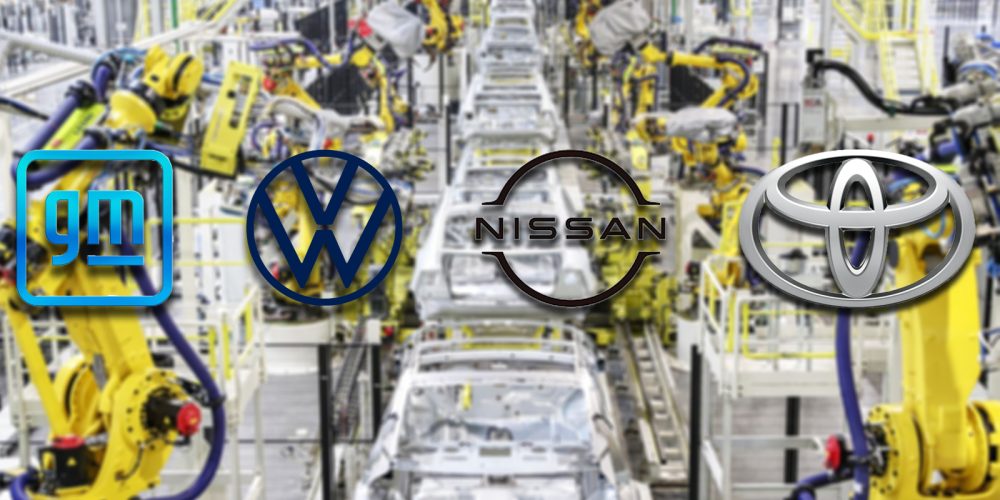
As the world enters 2021 with a cautious optimism, its global markets are still feeling many of the repercussions of the COVID-19 pandemic that have yet to be eradicated. Many people have pivoted toward remote work. This has increased smartphone and laptop demand, leading to shortages of essential components like semiconductors. One industry that is beginning to experience the impact of these shortages is automakers. If semiconductor manufacturers can’t catch up, it could spell more delays for several major automotive companies.
Semiconductors in electric vehicles
As you read these words from your smartphone, tablet, or laptop, semiconductors are helping transport electrical currents throughout your device. They ensure all the microprocessors and transistors are functioning. This reliance is no different for electric vehicles. Since EVs rely so heavily on the capacity of batteries, they have long been limited to less than optimal ranges.
However, advancements in the chemistries of semiconductors like gallium and silicon carbide have allowed EV batteries to function at higher voltages. These sorts of breakthroughs have helped EV automakers like Tesla drive down its cost of vehicles for consumers.
It’s not just the batteries either – semiconductors have become imperative to the advanced electronics attributes that continue to grow. Features like blind-spot sensors, cameras, and full self-driving (FSD) capabilities, all rely heavily on semiconductor chips. Furthermore, as EV innovations advance and necessitate further electric integrations, chip demand is sure to grow.

Why a semiconductor shortage is a big deal
Simply put, the current state of semiconductor manufacturing is a case of supply and demand. In this particular situation, the global demand exceeds the available supply. This is not just an issue for automakers, unfortunately. Semiconductors and their unique atomic structure are universally present in all electronics including diodes, transistors, or circuitboards. This demand stems far past electric vehicles… or any vehicles for that matter.
For automakers especially, semiconductor chips are responsible for the function of vital components in the vehicle. This means everything from safety sensors, to brake systems, to driver assistance technology. If those chips are not available to a company like Toyota, they cannot carry on with assembly and simply come back to it when a fresh shipment arrives. These semiconductors chips are at the electronic heart of each and every vehicle.
Several automakers are already halting production
Due to the lack of available components worldwide, many well-known automakers have already begun halting certain production lines in their factories. General Motors is the latest big name to announce production line freezes for multiple plants. According to Reuters, GM joins Ford Motors, Nissan, Toyota, Volkswagen, Suburu, and Fiat Chrysler in decelerated assembly due to chip shortages.
Other foreign automakers like Renault and Stellantis have also been affected. As a result, they have suspended car production at several factories in Europe. These global automakers have been caught off guard by the chip shortage with little contingency to fall back on. At the very least, this shortage has shined a costly spotlight on the world’s reliance on a select group of semiconductor manufacturers, specifically in Taiwan.

Where Tesla sits among a semiconductor shortage
During extensive toil among many automakers, Tesla appears to be keeping its head down and pushing onward. The American automaker has yet to make any comments on the semiconductor shortage and appears to be operating business as usual. It began developing its own chips in 2016, before its first self-driving computer chip debuted in 2019. Tesla then looked to improve the chip with TSMC (see below), using the manufacturer’s 7nm process. New information has just surfaced to reveal Tesla has partnered with Samsung to develop a 5nm FSD chip. That being said, Tesla’s new chips are not slated for mass production until Q4 2021. Nevertheless, Tesla has its own chip manufacturing processes to worry about.
Semiconductor manufacturers face their own delays
If it isn’t inherently clear by now, no one foresaw the tremendous impact a global pandemic would put on the world’s economy and the strain it would put on supply chains. Semiconductor manufacturers are no different. With huge boosts in demand for electronic devices surging, they too are struggling to keep up.
Taiwan is home to large tech corporations like Taiwan Semiconductor Manufacturing Co (TSMC), the world’s largest contract chip maker. Shanghai-based Semiconductor Manufacturing International Corporation (SMIC) is also an important player in the global semiconductor supply chain. Some suppliers like SMIC were hit with stifling government restrictions implemented by the Trump administration. According to a report by Reuters, one automaker moved its chip production from a restricted-riddled SMIC to TSMC, only to find that the manufacturer had been overbooked.
As the world’s largest chip maker, TSMC has quickly become the face of the semiconductor shortage. It has also stepped up as the assuring voice behind efforts to meet urgent and extensive demand.

How the world is tackling the semiconductor shortage
It’s clear that the world was caught off guard by the surge in semiconductor demand. It is only now strategizing how to bounce back. The United States has recognized that its reliance on chips from other countries can pose delays to manufacturing stateside. It is looking to amend that. This past week, 15 U.S. senators from key auto manufacturing states urged the Biden administration to work with Congress to address the global chip shortage.
The call-to-action requests efforts to secure necessary funding to quickly implement the resources required to boost production of semiconductor manufacturing. The senators also briefly mentioned incentivizing the production of semiconductors stateside in the future. That move would certainly shorten the supply chain for American automakers.
So far, the US has supported TSMC’s efforts in keeping up with semiconductor demand. The Taiwanese company has built a firm relationship with US federal and state governments as it works to erect a $12 billion chip plant in Arizona. For now, however, companies like TSMC and SMIC must focus on meeting the current demands from automakers and electronics manufacturers alike. It appears the US will try to assist in expediting the manufacturing process… or at the very least, stop suppressing it.
Subscribe to Electrek on YouTube for exclusive videos and subscribe to the podcast.
Author: Scooter Doll
Source: Electrek



